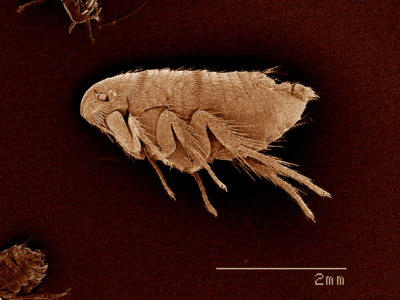Parasite Prevention

Flea and Worming
Fleas and worms are parasites that can lead to severe health issues in your dog or cat, such as gastrointestinal problems, anemia, and skin allergies. These parasites can also pose risks to humans, especially if there are children in the home. Ensuring regular treatment for fleas and worms in your pets is crucial for maintaining the health and safety of your entire household.
Benefits of treatment:
Prevents infestation
Health protection
Prevents anaemia
Saves on vet bills
Reduces allergies
Prevents internal damage
What are the causes?
Preventing fleas and worms can be challenging, especially since our pets frequently encounter other animals, including both household pets and wildlife. Some fleas are known to carry worm larvae, underscoring the difficulty in avoiding these pests. This makes it crucial to provide your dog or cat with preventative treatment rather than waiting until they have already been affected.
Main types of Parasites

Roundworm
Roundworms are parasites that live freely in the intestine, feeding off partially digested intestinal contents.

Tapeworm
Tapeworms are flat, segmented intestinal parasites of the cat and dog.

Flea
Fleas are small insects that are parasitic; they feed on blood from animals and/or people.
How to prevent?
Flea medications and dewormers come in mainly two forms: tablets or topicals (spot-on treatment). After seeing your pet and updating its weight, we determine the required dosage and dispense the medication of your choice to your pet.
When treatment should be given

Flea Treatment
Flea treatment for pets should generally be given every month, but the exact frequency depends on the type of treatment you’re using and your dog’s risk of exposure to fleas.
Dogs
Monthly or 3 Monthly Application: Most prescribed flea treatments, whether topical (spot-on) or oral, are designed to be administered once a month or every 3 months. These treatments are highly effective and provide continuous protection against fleas and other parasites.
Cats
Monthly Application: Most prescribed flea treatments for cats, whether they are topical (spot-on) or oral, are designed to be administered once a month. These treatments are highly effective and provide continuous protection against fleas and sometimes other parasites.

Worming Treatment
The frequency of worming treatment for pets depends on factors like the type of pet, their age, lifestyle, and the specific worms being targeted.
Dogs
Puppies:
- Every 2 weeks: From 2 weeks of age until 12 weeks old.
- Monthly: From 12 weeks to 6 months old
Adult Dogs (over 6 months)
- Every 3 months: For most dogs, a regular worming treatment every 3 months (4 times a year) is sufficient.
- More frequent treatment: Dogs with higher risk factors, such as those that hunt, scavenge, or are exposed to other animals’ feces, may need more frequent treatments (e.g., every 1-2 months).
Pregnant or Nursing Dogs
- Prior to giving birth: Dogs should be wormed before mating, after mating, and before whelping (giving birth).
- During nursing: Nursing dogs and their puppies may require more frequent treatment to prevent the transmission of worms.
Cats
-
Kittens: Kittens should be wormed every two weeks from the age of 3 weeks until they are 8 weeks old. After that, they should be treated monthly until they are six months old.
-
Adult Cats: For adult cats, worming should generally be done every 3 months (4 times a year). However, if your cat hunts, or if they spend a lot of time outdoors, they might need more frequent treatment, around every 1-2 months.
-
Pregnant and Nursing Cats: Pregnant cats should be wormed before mating, after the 15th day of pregnancy, and then again once the kittens are born. Nursing cats should be treated concurrently with their kittens.
New Prescribing Protocol
After seeking further guidance from the Royal College Of Veterinary Surgeons, we have made changes to the way we prescribe Flea and Worm treatments and introduced a new protocol.
Flea and worm prescriptions now need to be associated with a physical examination, we have decided to conduct these health checks for free, provided the patient has been seen by our vet within the last 12 months (after the 14th January).

Book Appointments
We are partnered with PetsApp
-
Text chat to the team
-
Book appointments
-
Request repeat prescriptions
-
Make a payment
-
Make an enquiry
-
Check how your pet is doing whilst they stay with us
-
Request a video consult with a vet
